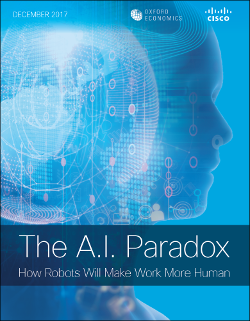Ungated Post | 26 Feb 2018
The AI Paradox – How robots are making work more human

Over the next decade, a great wave of technological change will wash through the economy, transforming the nature of work and the shape of the labour market. We collaborated with Cisco to study the implications of these trends on jobs over the next decade. Our results are based on a brand-new, multi-layered modelling framework, that enables us to simulate the real-world dynamics of technological change and its interaction with the world of work.
We found that 6.5 million US workers will have to seek out a new profession over the next decade. Workers in transport, lower-level manufacturing and agriculture jobs will face a difficult time. Meanwhile, we see new jobs emerging in other areas, such as computing, management and media, as well as in healthcare and sales.
The Oxford Economics Skills Matching Model is used to help us simulate the job-moves workers will make in response to a shift in the nature of work. What emerges are signs the US is facing a significant reskilling challenge. There are acute ICT skills shortfall to overcome and, paradoxically, as technology becomes more capable it is "human skills" that explain much of the gap between today’s workforce and the needs of the future.
Oxford Economics’ team is expert at applying advanced economic tools that provide valuable insights into today’s most pressing business, financial, and policy issues.
To find out more about our capabilities, contact:
Americas
Diantha Redd
+1 (646) 503 3052
Email
Asia Pacific
Peter Suomi
+65 6850 0110
Email
EMEA
Aoife Pearson
+44 (0)203 910 8054
Email
Related Services

Post
Global Trade Education: The role of private philanthropy
Global trade can amplify economic development and poverty alleviation. Capable leaders are required to put in place enabling conditions for trade, but currently these skills are underprovided in developing countries. For philanthropists, investing in trade leadership talent through graduate-level scholarships is an opportunity to make meaningful contributions that can multiply and sustain global economic development.
Find Out More
Post
Mapping the Plastics Value Chain: A framework to understand the socio-economic impacts of a production cap on virgin plastics
The International Council of Chemical Associations (ICCA) commissioned Oxford Economics to undertake a research program to explore the socio-economic and environmental implications of policy interventions that could be used to reduce plastic pollution, with a focus on a global production cap on primary plastic polymers.
Find Out More
Post
The Economic Contribution of Mexico’s Audiovisual Industry
This report demonstrates the integral role that the AV industry plays in Mexico's economy by estimating the industry’s domestic economic footprint. The analysis comprises all aspects of the audiovisual industry, including film production, distribution, and exhibition; the production, distribution, and broadcast of television content on free-to-air and pay TV channels; and online video platforms. Our estimates provide a recent snapshot of the audiovisual industry, including impacts at the broader industry level and broken out by sub-sector.
Find Out More